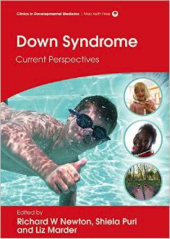Overview
Down Syndrome results in a reduction in brain growth and development.
Children’s development is affected by low muscle tone, poor motor coordination, and slower processing of information, resulting in delay in acquiring skills. Attention span is often short, and poor auditory memory contributes to language delay.
Developmental Disorders such as ADHD and Autism are more common in children with Down Syndrome, but may present and be diagnosed later.
Epilepsy is more common in Down Syndrome, with presentation most likely in infancy, or in adults over 30 years of age. Infantile spasms, or West syndrome, present between 5 – 15 months of age. Generalised seizures may present in later childhood. In adults, onset of absence epilepsy may be an early sign of dementia.
Deterioration in walking or bowel or bladder control may be a sign of cervical spine instability affecting the spinal cord and needs urgent investigation and management.
Regression in skills and emotional and behavioural withdrawal in adolescence may be due to many causes including hypothyroidism, deterioration in vision or hearing, depression, or other difficulties such as Catatonia.
Stroke is rare in Down Syndrome, but if it occurs, underlying causes such as heart disease (SBE), or Moya-Moya syndrome which is a progressive condition must be considered.
DSMIG Guidance
Cervical spine disorders: craniovertebral instability
Guideline for Basic Essential Medical Surveillance
DSMIG’s evidence-based guideline for basic essential medical surveillance.
Last updated: 2012
PCHR insert for babies born with Down syndrome: Developmental Milestones
Presentations at DSMIG Meetings
Materials from meetings are available for members only who need to log in to access them. For details on how to become a member click here.
Additional Resources
Book Chapter – Neurological Disorders in Down Syndrome Richard Newton
in
Down Syndrome – Current Perspectives
 Edited by Richard Newton , Shiela Puri and Liz Marder
Edited by Richard Newton , Shiela Puri and Liz Marder
Infantile Spasms in Children with Down Syndrome: Identification and Treatment Response
Dee Daniels et al Glob Pediatr Health. 2019; 6: 2333794X18821939
Infantile Spasms in Down Syndrome – effects of delayed anticonvulsant treatment Eisermann MM et al, 2003 Epilepsy research 55:21-27
Lennox-Gastaut syndrome with late-onset and prominent reflex seizures in Trisomy 21 patients Ferlazzo E, et al, 2009 Epilepsia 50:1587-1595
Moya-Moya syndrome associated with Down Syndrome: Outcome after surgical revascularization Jea A et al, Pediatrics 2005;116;e694-e701
Cognitive deficits and associated neurological complications in individuals with Down’s Syndrome Lott IT, Dierssen M, 2010 Lancet Neurology, 9:623-633
